Do not wait to write.
Not for love, nor money;
Not for attention nor glory.
Do it to heal &
because you are compulsive &
because the story claws at your attention &
because those words weigh down the gut…

the life and times of an ever-victorious woman
Do not wait to write.
Not for love, nor money;
Not for attention nor glory.
Do it to heal &
because you are compulsive &
because the story claws at your attention &
because those words weigh down the gut…
I’m reading The Year of Magical Thinking by Joan Didion. It’s wonderfully written, yet halfway in, I’m not sure I like the book. Well, the book I like. It’s my relationship to the book that puts me ill at ease.
I came to the book from several sources.
One. A mentor/advisor recommended it once she discovered my renewed interest in journalism and creative writing. She spoke highly of the author in general and this book in particular, so I added to my ever-growing List of Books to Read.
Two. Every now and again I review the list of Pulitzer Prize winners and add them to the similarly growing, often overlapping List of Writers to Know.
Three. Pearl Cleage’s newest book arrived amidst much fanfare, and more than once I saw Joan Didion’s name referenced as a peer. As in, this book is autobiographical/confessional and brings to mind other well-read writers like Joan Didion.
Four. In the aforementioned book, Pearl notes Joan’s work (although not this offering – it hadn’t been written at the time). As it was already on two Lists, and her name was becoming a steady fixture in my consciousness, I finally ordered it.
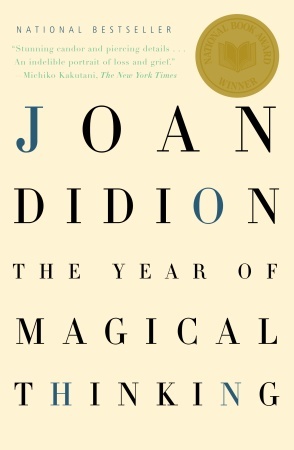 So, the book…The very first page compels. Yet soon thereafter, I’m repelled. She’s exploring her husband’s sudden death, and it’s so well done, I feel it.
So, the book…The very first page compels. Yet soon thereafter, I’m repelled. She’s exploring her husband’s sudden death, and it’s so well done, I feel it.
Having experienced my mother’s death up close (albeit 11 years ago), much of what she wrote hit notes I wasn’t prepared to experience. The circumstances and the relationship were different, but the trauma and the grief remain true.
I put it down for a day or so.
I picked it up again and found myself, at turns, congratulating myself and questioning the book. Congratulations because I saw whispers of my writing style in hers, and I thought this might be a good mentor text for professional development. Questions because, unlike Pearl’s book which seemed to edify and affirm something in me, Joan’s book felt more… I hesitate to say it… self-serving?
I believe in the power of storytelling, yet something about this storytelling seems to serve the teller. Which is an interesting critique given my praise of Pearl as her journals were originally meant to serve herself. Pearl didn’t write them to publish them. She wrote them to reflect. I don’t know if Joan set out to document this period in her life so she could publish it, or decided later on the story could be valuable. It certainly can be. I’m sure it has been.
To be fair, I’m at the halfway point. And maybe the crux of my resistance is the emotion. Because her writing is so clear, because she lets you inside the black box, you know and witness and feel everything. Which is good writing, great writing, but a bad feeling if that’s not the feeling you want.
So I have mixed feelings. I like the book, but I don’t love it. I do plan to finish reading it.
Did you read it? What did you think of it?
I’m 2/3s of the way done with Pearl’s book. I’ve been on a first name basis with her since I began this journey.
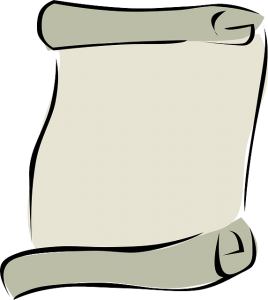 Reading it makes me wonder how much wisdom gets lost because women don’t share their most intimate thoughts? Either aloud or in writing? Many of us live our lives, and simply figure out the hard shit as we go along.
Reading it makes me wonder how much wisdom gets lost because women don’t share their most intimate thoughts? Either aloud or in writing? Many of us live our lives, and simply figure out the hard shit as we go along.
Some read the self-help gurus say, and I’m sure there’s plenty of insight to be gained by doing so. Others bond and grow through occasional talks with a close friend.
But how many of us engage in a systematic effort to document (your real) life and the lessons it teaches you? Either for your own reflection and edification or for the express purpose of passing it on? If we are not the keepers of our stories, who should be? When our stories fade, our wit and wisdom fade also.
I’ve written before about questions I’d love to ask but can’t. There’s also this about the importance of family narrative. There’s so much learning to be gained in the living of life, yes, and eve more so in the telling and retelling of it.
Do you document your life? Why or why not? How do you or how would you if you started today?
This is stream of consciousness from my efforts at NaNoWriMo last fall. This is fiction. I wrote 1,000 words a day for 30 days. This excerpt was selected at random this afternoon. This is raw data. For better or for worse, it’s unedited.
I finally arrive and set up as close to the ocean as possible. Only a few people are out. I stretch out my sheet and lay my belongings on top. I quickly strip down to my suit. It’s a simple black bikini this time, and I’m aware of a few appraising eyes glancing at my glutes. I tie my hair in a messy knot atop my head and stride toward the ocean. I sigh as my feet, right first, then left, touch the cool, clear water. The bottoms of my feet barely register the little shells underneath.
I walk on.
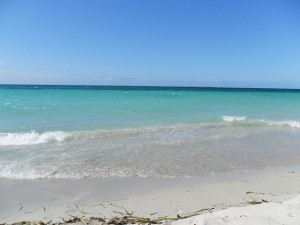 The water is to my ankles. My calves. I stretch my hands out, beckoning the water to me. Beckoning my spirit to it. I keep walking. My hips are underwater now. I stop and slide down, until the water is at my neck. On my knees, I am still. I play a game with the water, keeping my abs tight, trying not to move my body. It’s good exercise.
The water is to my ankles. My calves. I stretch my hands out, beckoning the water to me. Beckoning my spirit to it. I keep walking. My hips are underwater now. I stop and slide down, until the water is at my neck. On my knees, I am still. I play a game with the water, keeping my abs tight, trying not to move my body. It’s good exercise.
Once fatigue sets in I stand up and walk a little deeper into the water. The waves come toward me and I draw them to me with big sweeping gestures to pull the water in. a little ritual. I say a little prayer – I welcome all the blessings and love of the universe into my heart, into my life. I turn around, facing the shore. Starting at my chest, I push outward, pushing the water away. I say another prayer – I expel all of the thoughts and doubts and sadness that no longer serve me. I pray that all the negativity is transmuted for the good of all mankind.
I turn around and repeat this ritual several times. Then I just play in the water for awhile. Spying the few people in the ocean with me. Admiring the sun. I swat at the schools of fish to see what they’ll do. They change direction and keep moving. There’s a lesson in that.
After about 20 minutes, I decide it’s nap time. I stroll back to the beach and begin untying my hair. I towel off and spray the Banana Boat liberally on my exposed skin. I add sunblock to my face and don my floppy beach hat. I stretch out on my back and begin dozing to my favorite sound in the world.
—
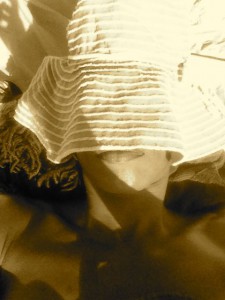 I wake up a few times and turn over. Don’t wanna be too brown on one side. Eventually I can no longer ignore the gnawing in my stomach. It’s lunch time. It’s been a long time since I’ve eaten alone. I tell myself it’ll be fun. Like old times. Relearning to enjoy singledom and solitude?
I wake up a few times and turn over. Don’t wanna be too brown on one side. Eventually I can no longer ignore the gnawing in my stomach. It’s lunch time. It’s been a long time since I’ve eaten alone. I tell myself it’ll be fun. Like old times. Relearning to enjoy singledom and solitude?
I guess.
I begin driving along the causeway just looking for someplace that might have some good fried oysters. I eventually stop at a Green Iguana. I know for sure they have good turkey burgers, and that would be yummy too.
How many? Asks the host. His spiked Mohawk just cool enough.
… Just one.
He begins to lead me to a table when I ask to go outside. I sit at one of the tall tables, remembering the last time I was here. Sophia and I met in person for the first time. She was a friend of a friend who thought it would be nice if we connected. It was. We did. Although I never saw her again after that. Our lives simply weren’t in sync.
I ordered the turkey burger I wanted. Avocado and pepper jack cheese. Lettuce, tomato. No onion. Fries. Yummy indulgences. I brush away tears from time to time. I savor each bite although I secretly want to wolf it down and get out of there as quickly as possible. Another round of tears I hide as those darn allergies. I even pull out a book to read. Zora Neal Hurston keeps me company. Probably not the most upbeat book in places, although it’s one of my favorites. Maybe I need to get a comedy or something more neutral that doesn’t involve relationships at all.
I think about going to Barnes and Noble to find another book. Then I remember, that’s where I met Daniel. I have a library card. I can go there instead. Or I can go home and download some ebooks.
I tell myself it’s okay. I’ll be okay. Today it’s just an exercise to prove to myself that I can be alone. That I can continue. Tomorrow I’ll do something similar. Go to my favorite dinner spot. Maybe I’ll even cook by the end of the week.
And one day, I’ll even remember what happiness feels like.
I posted a fiction excerpt one other time. Check it out here.
It’s always an interesting exercise to blog every day for 30 days. As the month wears on, it gets alternately easier and more challenging. Mostly easier. I look back and realize there were a couple of interesting posts in the jumble of freewrites, last-minute entries, and comments on other people’s writing. That’s nice to see.
I have a little over a week in this particular challenge, and as usual, I’m thinking about my public vs. private writing. The things I want to write about and the things I end up blogging are often different. I have mixed feelings about this. But as this is my fourth time engaging in this sort of daily blogging practice and my findings have been the same each time, I’m going to act on the findings instead of opting to collect more data.
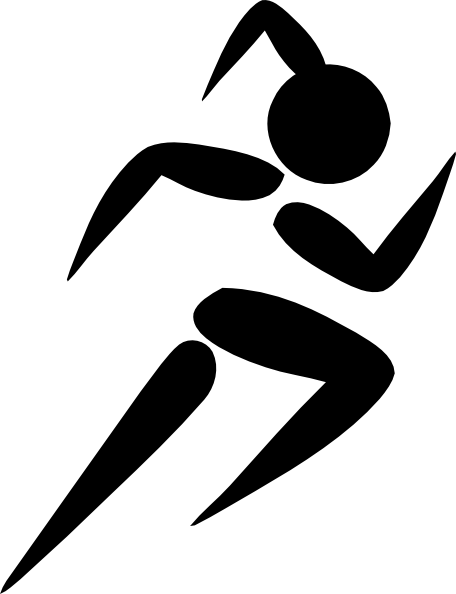 Today I ran. It was my 6th run this year. I started at 2.20 miles the first run, and have been steadily increasing a bit each run.
Today I ran. It was my 6th run this year. I started at 2.20 miles the first run, and have been steadily increasing a bit each run.
Today’s run was 3.25, a 5K. When I get up to 4 miles, I’ll be back at my average distance.
I’m thinking of making 5 or 6 miles be my new standard, or perhaps running 7 miles once a week and keep the other runs short (and faster with intervals).
Not sure yet.
I’m going to leave you with a quote I saw this morning; one of my long-standing favorites. It’s attributed to Goethe, but it seems unlikely he actually wrote it. Still, it vibrates with power, and isn’t that the best way to start off the work week?
Whatever you can do or dream you can, begin it. Boldness has genius, power and magic in it.
Check out this piece by Daniel José Older, about the lack of diversity in the publishing industry. The topics he engages here speak to some of the reasons I’ve considered launching an independent publishing house myself.
From the piece:
In the New York Times last month, children’s book illustrator Christopher Myerswrote about “The apartheid of literature — in which characters of color are limited to the townships of occasional historical books that concern themselves with the legacies of civil rights and slavery but are never given a pass card to traverse the lands of adventure, curiosity, imagination or personal growth.”
Myers’ father, author Walter Dean Myers, wrote about growing up a bibliophile in Harlem, falling out of love with books when they offered up no characters he could relate to, and the revelation of reading Sonny’s Blues by James Baldwin: “I was lifted by it, for it took place in Harlem, and it was a story concerned with black people like those I knew. By humanizing the people who were like me, Baldwin’s story also humanized me. The story gave me a permission that I didn’t know I needed, the permission to write about my own landscape, my own map.”
These two essays perfectly frame the emotional and social debacle of publishing and diversity today. They begin with this stat: “Of 3,200 children’s books published in 2013, just 93 were about black people,” according to a study by the Cooperative Children’s Book Center at the University of Wisconsin. The wide world of literature in general, and by no coincidence, the publishing industry itself, suffer from similarly disastrous numbers.
He goes on to critique the industry’s history of victim-blaming, wherein gatekeepers are somehow blameless and those who seek entry are denied, in large part, because they are too different from the establishment. A bit too diverse, it seems.
Writers are encouraged to white-wash characters and make them more recognizable to gatekeepers. Moreover, they are shaded as being poor writers who are too lazy to improve their craft. Funny how that works – legions of writers representing alternative points of view are simply less talented than all the “traditional” storytellers.
And really, what can agents and publishers do when The Market says folks won’t buy literature featuring underrepresented characters? Hands thrown up in despair, they are free to march ever onward into the Land of Sameness.
Daniel calls on industry insiders to examine their privilege, and consider concrete ways to expand publishing to look more like the world actually is. This is quite a deal more difficult than simply maintaining the status quo. And yet, he says, diversity isn’t enough:
We’re right to push for diversity, we have to, but it is only step one of a long journey. Lack of racial diversity is a symptom. The underlying illness is institutional racism. It walks hand in hand with sexism, cissexism, homophobia, and classism. To go beyond this same conversation we keep having, again and again, beyond tokens and quick fixes, requires us to look the illness in the face and destroy it. This is work for white people and people of color to do, sometimes together, sometimes apart. It’s work for writers, agents, editors, artists, fans, executives, interns, directors, and publicists. It’s work for reviewers, educators, administrators. It means taking courageous, real-world steps, not just changing mission statements or submissions guidelines.
It’s a thought-provoking piece. Read the rest (and see Julie Dillon’s gorgeous art) here.
From Joshunda’s interview with Pearl Cleage:
A dual history of bias and internalized oppression has kept most black women from publishing their memoirs or journals, Cleage adds, for fear of emotional and economic reprisals. “After slavery ended, black women continued to put forward the idea that we were good, sexually responsible women, going up against the racist stereotypes that came out of the madness of slavery,” Cleage says. “But there was still the fear of being too honest around white people. I don’t feel that’s a legitimate feeling for me. I’m going to tell the truth to whoever is in the room.”
When I read truth, I feel courageous and emboldened. Powerful. Magical. Writing the truth, however, is altogether different. But when I do, that’s when folks nod. Say, I felt that. I needed that. I never knew that. Amen.
From Joshunda: Cleage says she drew her inspiration for the book from the diaries of Anaïs Nin, which she found liberating and inspirational, much like the work of Walker and Shange.
Sounds familiar. Truth is hard to come by in the pages of books, although I must admit I wasn’t exactly searching for it as a younger woman. Discovering it, though, was quite a revelation. Filling. There was that magic, that power I didn’t know I sought. Reading it encouraged me to write it, yet in the beginning I found it hard to lay truths on the page. They were there, but buried. Hidden in metaphor and verse. Rarely plainspoken and clear.
It’s less hard now. But this doesn’t mean easy.
 It’s also slow at times, truth-telling is. Because there’s this contextualizing you have to do. Background building. Setting the stage and what have you.
It’s also slow at times, truth-telling is. Because there’s this contextualizing you have to do. Background building. Setting the stage and what have you.
And then there’s the crafting. Are you conveying what you really mean to say? Who might be hurt? Who might feel misrepresented? Are you true to you?
I did not want to be the traitor, the teller of family secrets – and yet I wanted to be a writer. ~bell hooks
Once you’ve framed it and crafted it, then there’s the time set aside for doubting. Is it too much? Who are you to give voice to this experience? And on it goes.
Until finally you shout, or whisper, “Me, dammit! It’s my truth. I’m telling it!” And you press send or publish as the case may be, and try to move on to the next thing without agonizing so much on the last thing.
And perhaps over time it gets easier. I dunno.
I do know it’s always a digging in. A meditation. A labor of love. Truth-telling is.
It’s freeing for truth and for the one who told it.
It’s difficult. But perhaps no more difficult than any other act of love.
Blue skies swirl to pink lights. Fade to gray.
It’s dusk.
I missed the blood moon eclipse last night, but I’m enjoying the sunset tonight.
I’ve been sweeping away cobwebs, opening taps, stretching writing muscles. This is blog entry #15 in 15 days, and as usual, I’m glad I opted for the challenge. Also as usual, there are pros and cons to posting every day. But the benefits outweigh the drawbacks and I’m glad to get back into a writing rhythm.
I’ve tried different approaches, but none seem to work as well as writing everyday. Writing everyday doesn’t mean publishing my writing everyday, and that’s the balance I’ll work on once we enter May.
For now, I shall continue with my daily entries.
To strive even higher, to do even better—the creative process is a desperate struggle to go beyond what we were yesterday. It is a battle against resting on our laurels, against the fear of losing what we have. It is an adventure into unknown territory. ~Daisaku Ikeda
There’s been a lot on my mind in recent weeks. Days. Hours. Even just now as I started to write this entry, I decided against any number of topics and decided to simply say hello.
Hello!
I’m being indecisive, but I’m almost sure this is my first entry in another #30in30. Once in a while I challenge myself to blog every day for a month. Generally I decide on a whim and just go for it.
I’ve felt a little stuck with my writing lately. No shortage of ideas, but time is at a premium as of late. Maybe this will help me work around and through a few things.
Here’s to the ride. You coming along?
I can’t recall if Cean or John or figured it out first. We were high school classmates, and for one reason or another Cean I think (or maybe John) saw my name written out: Nicole Collier. Doodling or something, he noted the co in Nicole and the Co in Collier. In that instant, the nickname Coco was born.
It didn’t catch on. Well not really, anyway. People have always called me whatever suited them: Nicole, Colie, Nicolette, Lette, Nicki, Nic, and so on. Cean called me Coco and John called me NiCocoButterBeanSoup. Maybe one or two others jumped on the Cocowagon. Everyone else stuck with whichever version of Nicole they liked.
I thought coco was cute in print, so I began to write it everywhere.
Somewhere in the middle of the AOL and Geocities explosion, when everyone’s website had animated .gifs and embedded music, I taught myself basic HTML and built the first version of cocostudio. It was black with turquoise and white letters. And yes, music was embedded (Joe Sample).
Fast forward to graduate school. I wanted to try my hand at my own domain. So in November of 1999, a month before I was due to graduate, I bought cocostudio.com. It served as a portfolio site as I interviewed for teaching jobs. It was yellow then, with cheerful colors.
Over the past 14 years it has been an electronic resume, a clearinghouse for photographs and clips, a calling card for freelancing, even a journal of sorts, before blogging became a thing. Many times I’ve archived everything and started from scratch – sometimes promising and postponing relaunches for up to two years at a stretch.
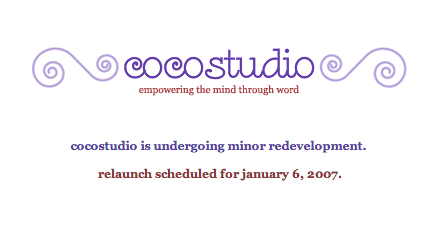
I think I’d been nearing the two-year mark this time around, but here we are. Too many times I’ve let perfect be the enemy of good. And honestly, I’ve often let it be the enemy of progress. But this year is about action, vibration, movement. Building.
What’s in store for you?